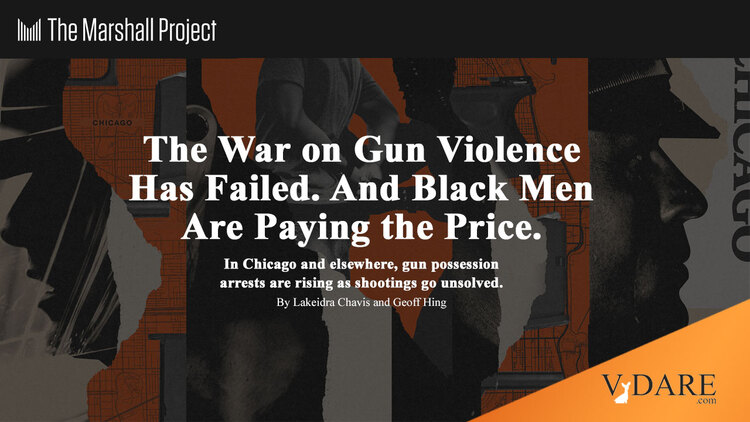


By Steve Sailer
03/24/2023
Earlier: Liberals Have Turned Anti-Gun Control In The Name Of Racial Equity
One of the crazier aspects of 2020s America is that the left has come to agree with the NRA about the utility of carrying handguns, only the NRA thinks that more law-abiding citizens should carry legal guns, while progressives think more criminals should be allowed to carry illegal guns.
From The Marshall Project, a leftist organization named after Thurgood Marshall rather than John Marshall or George C. Marshall:
The War on Gun Violence Has Failed. And Black Men Are Paying the Price.
In Chicago and elsewhere, gun possession arrests are rising as shootings go unsolved.By LAKEIDRA CHAVIS and GEOFF HING
FEATURE · FILED 03.23.2023 6:00 a.m.
In Chicago, the race to get guns off the street often begins with a police stop.
Officers just need a pretext to search someone: A man in a white Ford Sedan blocking an alleyway. A bulge in a fanny pack at the beach. A man breathing heavily in a black Chevrolet Malibu as police approached. The smell of “fresh cannabis” wafting from an open window. Tinted windows. A missing license plate. Police reports show that the list goes on.
This article was published in partnership with WBEZ and Chicago Sun-Times.
Authorities tout these arrests as an effective crime-fighting strategy. “Each gun recovered, regardless of how, is a potential life saved,” said former Chicago Police Superintendent David Brown in a press conference last year. It’s a common refrain repeated by officials from San Jose, California, to the small city of Utica, New York, as gun deaths rose across the country.
But in Chicago, a town labeled as “ChiRaq,” a “war zone,” and a “murder capital,” gun enforcement overwhelmingly focuses on possession crimes — not use.
A Marshall Project analysis found that from 2010 to 2022, the police made more than 38,000 arrests for illegal gun possession. These arrests — almost always a felony — doubled during this timeframe. While illegal possession is the most serious offense in most of the cases we analyzed, the charges often bear misleading names that imply violence, like “aggravated unlawful use of a weapon.”
Recent research shows that most people convicted in Illinois for felony gun possession don’t go on to commit a violent crime, and the majority of those sentenced to prison for gun possession don’t have past convictions for violence. Instead, people who already committed violent crimes are more likely to do so again.
The racial disparities in this enforcement are glaring. Although Black people comprise less than a third of the city’s population, they were more than 8 in 10 of those arrested for unlawful possession in the timeframe we reviewed. The number of Black people arrested could fill every seat at a Chicago Bulls game and then some; the majority are men in their 20s and 30s.
The consequences of these arrests are long-lasting. If convicted, people face a year or more in prison, depending on the charges. Even without time behind bars, those we interviewed faced damning criminal records, time on probation, job loss, legal fees and car impoundments.
Officials justify the focus on confiscating guns — even if they are not being fired at anybody — as a way of curtailing violence. But these tactics have not substantially reduced shootings in Chicago. In fact, as possession arrests skyrocketed, shootings increased, but the percentage of shooting victims where someone was arrested in their case declined.
“Guns are not assembly-line cases, and they shouldn’t be treated as such,” says Chris Hudspeth, 31, who has been incarcerated for illegal gun possession. “I’m scared for my life — and I gotta go to prison because I fear for my life, for my family’s safety? Because we’re not fortunate enough to live someplace else?”
The Chicago Police Department did not respond to repeated requests for an interview, nor did they comment on findings The Marshall Project shared with them. Gun arrest practices rest with the next mayor, whom voters will choose in an upcoming runoff election. The options are stark: Brandon Johnson, a Black county commissioner pitching police reform, and Paul Vallas, a White perennial candidate and veteran education official backed by the city’s police union. Despite running on seemingly different platforms, both mayoral candidates are suggesting tough-on-gun policies to address public safety.
For this article, we read nearly 300 arrest reports to understand the tactics police use to find guns, and compiled decades of police data showing a history of discriminatory gun enforcement. We conducted more than 100 interviews with people navigating gun cases, researchers, attorneys and community members. Our reporting focused on Chicago, given its struggles with gun violence despite strict firearm laws, but we identified several other cities with similar trends.
The Marshall Project found that widespread stops and gun possession arrests — and the inability of Chicago officials to show they are working — have parallels to other discredited strategies like “broken windows” policing, stop-and-frisk and the war on drugs.
“People are for ‘gun control’ but against ‘mass incarceration,’” said James Forman Jr., a professor at Yale Law School and author of “Locking Up Our Own: Crime and Punishment in Black America.” “They haven’t thought about how this particular form of gun control ends up helping to produce and sustain mass incarceration.”
In a country where guns are deeply intertwined with race, class and safety, discussions about them are often guided by politics and sensationalism. But as officials try to address street-level gun violence and prevent yet another mass shooting, it’s important to understand how firearm laws play out in reality, upending deeply ingrained assumptions about guns, who should have them, and how laws are enforced.